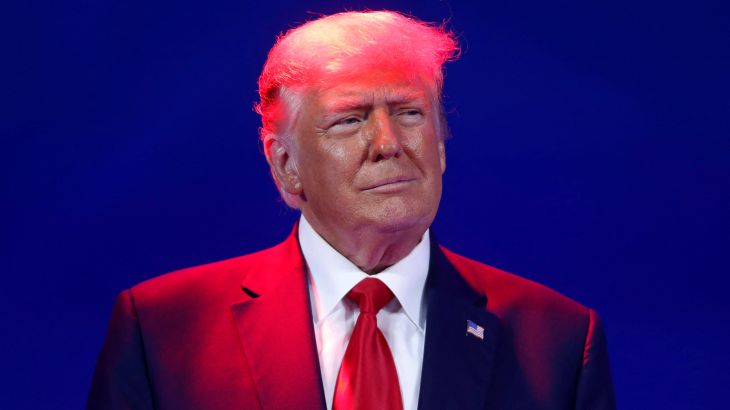What happens next following Donald Trump’s indictment?
Trump is expected to turn himself in to authorities next week, but when exactly he will do that is not yet known.

Former United States President Donald Trump was indicted by a Manhattan grand jury in New York, prosecutors and defence lawyers said, after an investigation into payments made during his 2016 presidential campaign to silence claims of an extramarital sexual encounter.
The indictment itself remains sealed for now in the first criminal charge against a former president in US history.
Keep reading
list of 4 itemsTrump holds first 2024 campaign rally, slams prosecutors
Trump indicted in New York, expected to be arraigned next week
Who is Stormy Daniels? The adult film star in Trump spotlight
Trump is expected to turn himself in to authorities next week, a person familiar with the matter but not authorised to discuss it publicly told the Associated Press. The person said the details of a surrender were still being worked out.
Here’s what happened on Thursday in New York and what is expected to happen next:
Criminal charges
- The grand jury, which meets in secret, voted to indict the 76-year-old former Republican president following an investigation led by the Manhattan District Attorney Alvin Bragg, a Democrat.
- While the indictment remains under seal, the charges against Trump are believed to relate to hush money payments made to adult film actress Stormy Daniels ahead of the 2016 presidential election.
- The grand jury, which has been meeting since January, indicted Trump after hearing testimony from a number of witnesses.
- Among those who testified were Trump’s ex-personal lawyer and fixer Michael Cohen, who has admitted arranging a $130,000 payment to Daniels to buy her silence about an affair she had with Trump in 2006.
- Trump was invited to testify in person but declined.
Surrender
- Manhattan District Attorney Bragg’s office said it had contacted Trump’s lawyer to coordinate his surrender and arraignment in New York at a future date.
- At an arraignment, a defendant is presented with the charges facing them and generally enters a plea.
- For any New York defendant, answering criminal charges means being fingerprinted and photographed, fielding basic questions such as name and birthdate. All told, defendants are typically detained for at least several hours during the arraignment.
- CBS said the Secret Service would be in charge of the arrangements.
- A judge then decides whether they should be released on bail or taken into custody.
- If Trump indeed turns himself in, expect a carefully choreographed and relatively quick process and release.
- A former president is not likely to be paraded in cuffs across a sidewalk or through a crowded courthouse.
- Extra security has been in place for days around the Manhattan court where Trump is expected to make his first appearance.
- But there is no playbook for booking an ex-president with US Secret Service protection. Agents are tasked with the protection of former presidents unless and until they say they do not need it. Trump has kept his detail, so agents would need to be by his side at all times.
Extradition
- Trump, who insists he is “completely innocent”, could refuse to surrender to the New York authorities, forcing them to seek his extradition from his Florida residence.
- Florida Governor Ron DeSantis, a potential Trump rival for the 2024 Republican presidential nomination, said his state would “not assist in an extradition request”.
- Legal experts said any attempt to fight extradition would at best result in a delay and Trump would eventually have to appear in New York to face the charges.
Next judicial steps
- Once Trump is arraigned and enters a plea, there will be a series of preliminary court hearings to set a date for a trial and decide on witnesses and evidence.
- A defendant can avoid going to trial by entering into a plea agreement with prosecutors, in exchange for a lighter sentence, for example. Given Trump’s proclamations of innocence that is unlikely.
2024 White House candidacy
- Trump can – and undoubtedly will – pursue his 2024 White House campaign despite facing criminal charges.
- Nothing in the US Constitution prevents someone from running for president while facing charges and even a conviction would not bar them from the nation’s highest office.
- The 14th Amendment does prohibit anyone who has “engaged in insurrection or rebellion” from holding elected office.
- The House of Representatives impeached Trump for “incitement of insurrection” for the January 6, 2021 attack on the US Capitol by his supporters but he was acquitted by the Senate.
- A special counsel is looking into Trump’s role in the January 6 assault on Congress and the former president could still face charges on that front.